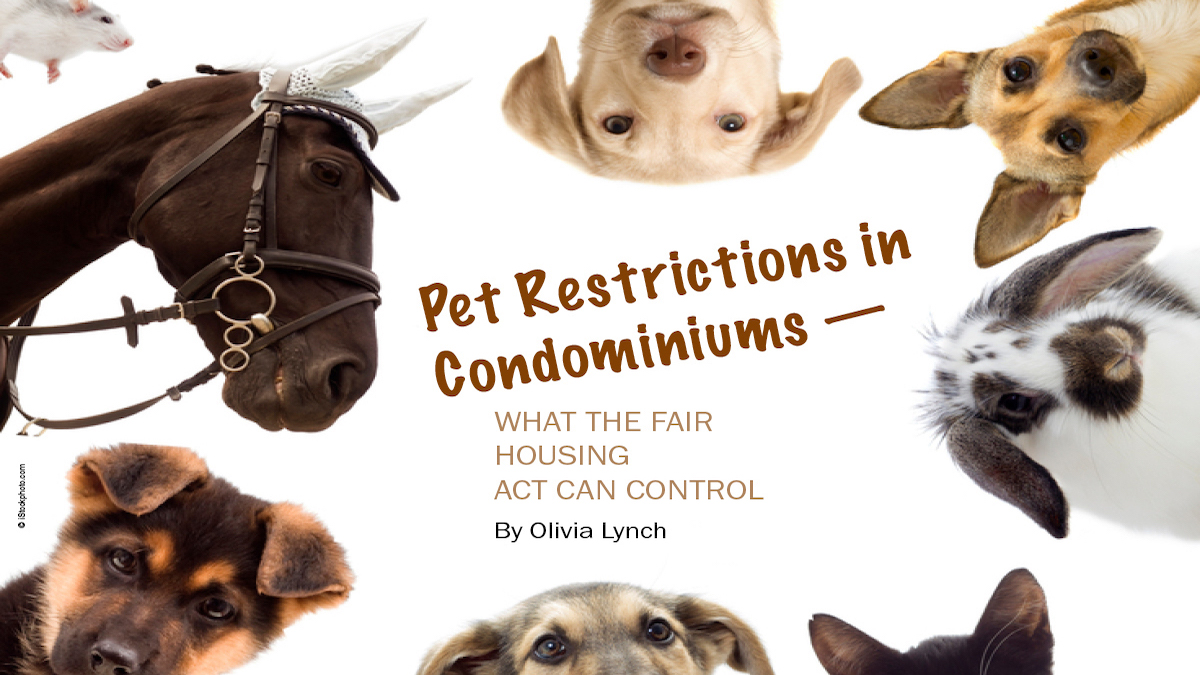
Pet Restrictions in Condominiums — What the Fair Housing Act Can Control
Feature Story
Pet Restrictions in Condominiums — What the Fair Housing Act Can Control
These days, many condo owners are wondering why they see so many dogs in their buildings and communities — even though they’re “not allowed.” What’s going on?
Stefan Richter, an attorney and shareholder at Clemons, Richter & Reiss, PC in Doylestown, Pennsylvania explained why it may be impossible for an association to enforce a total ban on pets. These types of restrictions, he explained, although handled on a case-by-case basis, are subject to pre-emption by the Fair Housing Act (FHA) of 1968 (as substantially amended in 1988). According to the Humane Society, the Fair Housing Act is “a federal law that that prevents discrimination against tenants in their homes.”
The Fair Housing Act requires that associations “make reasonable accommodations in rules, policies, practices, or services, when such accommodations may be necessary to afford such person equal opportunity to use and enjoy a dwelling.” Among such accommodations is an exemption for certain handicapped individuals (including owners and tenants) from restrictions against pets — thus allowing them to keep and maintain support or service animals, explained Richter.
In order to qualify for a reasonable accommodation, a person must be handicapped, and must show that (in this case) a support or service animal is necessary to permit that person to use and enjoy the welling. Handicap is very broadly defined, and encompasses more than physical disabilities. For example, emotional or psychological illnesses or conditions often qualify as handicaps.
Although both type of animals may qualify under the Fair Housing Act, emotional or “support” animals are not to be confused with service animals, Richter explained. Service animals are meant to assist with daily life activities, such as in the case of a Seeing Eye® dog. In most cases, service animals are individually trained to provide specific assistance. On the other hand, emotional support animals do not require any type of certification or training. “They are, in essence, the handicapped person’s therapy. Emotional support and service animals are not considered pets,” said Richter. “Community or condominium associations are required by law to make an exception to their pet restrictions to afford the person with a handicap the opportunity to enjoy a dwelling.”
While associations retain some flexibility to impose reasonable rules governing behavior of the support or service animals and their impact on other residents, such conditions must be considered on a case by case basis.
Are emotional support animals limited to cats and dogs? In short, no. Richter cited a recent case where a turkey was considered an emotional support animal, and therefore permitted fly on a Delta Airlines flight. (Google emotional support turkey) “The type and kind of accommodation is generally determined by the handicapped person — associations cannot offer a support cat when a support dog is sought.” In the case of dogs, for example, size, weight or breed limitations cannot be imposed as conditions of approval. However, the animal’s conduct can be reasonably governed.
How do owners prove they require an emotional support animal? “Applicants must provide written evidence from a physician or therapist stating that not only does the person have a disability, but that the support animal is necessary to cope with their disability or its symptoms,” said Richter.
Can associations impose fees or rules on support animals? “I have seen condominiums [that allow pets] impose a pet registration fee for animals, but that fee cannot solely apply to a disabled person,” said Richter.
Richter also commented that these animals must not become a nuisance in the community. “Behavior of an animal and an owner’s handling of the animal is key, regardless as to whether the animal is a reasonable accommodation,” said Richter. “If there is a particular problem, like a service dog barking all night, the association should act to enforce its typical regulations.” Associations may also restrict where these animals are allowed to urinate and defecate, as long as the location is reasonable.
Concerning animal restrictions generally, “I recommend associations stick to [enforcing] conduct and stay away from other limitations. Pets will grow and certain breeds have reputations, but that doesn’t make them any more or less dangerous. There have been cases with snakes, pigs, chickens and farm animals that people want to keep as pets. Those do come up. And for that, it all comes down to the governing documents and a board’s reasonable business judgment. If a rule is not written to address the specific animal, board’s may have to exercise common sense and discretion.
Tags: Article
Trackback from your site.